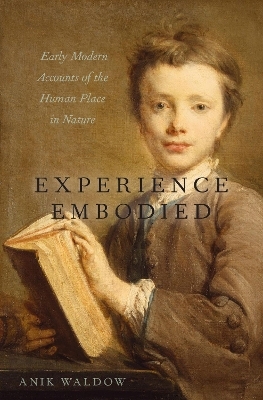
Experience Embodied
Oxford University Press Inc (Verlag)
978-0-19-008611-4 (ISBN)
These questions emerged for many early modern authors since they understood that the fact that humans are embodied entailed that they are similarly responsive and causally-determined like other non-human animals. While this perspective made it possible to acknowledge that humans are part of the causal dynamics of nature, it called into question their ability to act in accordance with the principles of free, rational agency. Experience Embodied reveals how early modern authors responded to this challenge, offering a new perspective on the centrality of the concept of experience in comprehending the uniquely human place in nature.
Anik Waldow is Associate Professor in the Philosophy Department at the University of Sydney. She mainly works in early modern philosophy and has published articles on the moral and cognitive function of sympathy, early modern theories of personal identity and the role of affect in the formation of the self, skepticism and associationist theories of thought and language. She is the author of Hume and the Problem of Other Minds (Continuum 2009), editor of Sensibility in the Early Modern Era: From Living Machines to Affective Morality (Routledge 2016), and co-edited Herder: Philosophy and Anthropology (OUP 2017).
Acknowledgements
Abbreviations
Introduction
Part I: The Moral Importance of Experience
Chapter 1: Experience and Cartesian Agency
1.1 Experiencing and Knowing the Self
1.2 Confused Notions of Body and Mind
1.3 Agency in the Conduct of Life
1.4 Conclusion
Chapter 2: Locke's Experiential Persons
2.1 On the Mental and Bodily Dimension of Reward and Punishment
2.2 Habit Training versus Conditioning
2.3 Persons as Agents
2.4 Reason, Reflection and Correction
2.5 Conclusion
Part II: On the Continuity between Sensibility and Reason
Chapter 3: Moral Reflection as Perception: A Humean Account
3.1 What is Natural about Human Nature?
3.2 Sympathy, Perception and Reflection
3.3 History and the Refinement of Moral Capacities
3.4 Conclusion
Chapter 4: Manipulated Sensibilities: Rousseau on Human Nature
4.1 The Theatre, Moral Education and Affective Susceptibility
4.2 Rousseau's Attack
4.3 Natural Goodness and the Construction of Morality
4.4 Normativity and Nature
4.5 Conclusion
Chapter 5: Affect and Imagination in Processes of Cognition: Herder
5.1 The Sensing Body and the Emergence of Language
5.2 Reason as an Organisational Principle
5.3 Discovering the World through Imagination and Affect
5.4 Conclusion
Part III: How to Study the Human Being? Philosophy and the Empirical Method
Chapter 6: Natural History and the Formation of the Human Being: Kant and Herder
6.1 The Human Place in Nature
6.2 The Organic Growth of History
6.3 Historical Explanations
6.4 Conclusion
Chapter 7: Diversifying Method: Kant's Janus-Faced Conception of the Human Being
7.1 Environmental Determinism
7.2 Kant's Dual-Aspect Account of Character
7.3 Anthropology as a Pragmatic Endeavour
7.4 Philosophy and the Sciences
7.5 Conclusion
Coda: Experience Embodied
Bibliography
Index
| Erscheinungsdatum | 06.02.2020 |
|---|---|
| Verlagsort | New York |
| Sprache | englisch |
| Maße | 239 x 160 mm |
| Gewicht | 567 g |
| Themenwelt | Geisteswissenschaften ► Philosophie ► Ethik |
| Geisteswissenschaften ► Philosophie ► Philosophie der Neuzeit | |
| ISBN-10 | 0-19-008611-4 / 0190086114 |
| ISBN-13 | 978-0-19-008611-4 / 9780190086114 |
| Zustand | Neuware |
| Informationen gemäß Produktsicherheitsverordnung (GPSR) | |
| Haben Sie eine Frage zum Produkt? |
aus dem Bereich


